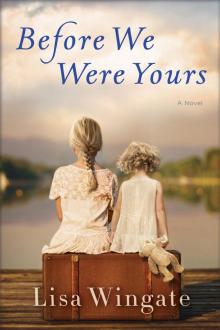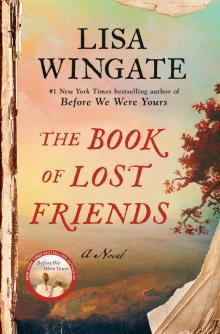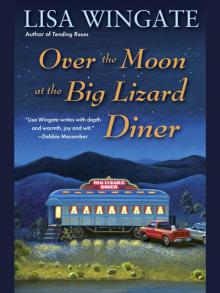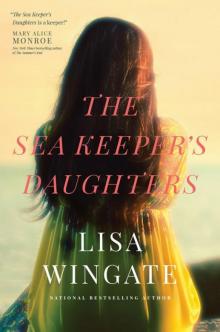- Home
- Lisa Wingate
Dandelion Summer Page 37
Dandelion Summer Read online
Page 37
Epiphany’s lips lifted into a smile; then she spun around and hurried unsteadily back to the bedroom, returning with her flip-flops dangling from her fingers. “No way I can drive in these things, though.” The sandals were a hair too small, perhaps, but passable. Balancing on one foot, she removed Annalee’s Moroccan sandals and then slipped into her flip-flops.
“As long as you change when we reach the restaurant. No flip-flops tonight,” I said, and then held out my arm. She put a hand under my elbow, as if to support me, and I paused to show her the manner in which a lady should expect to be escorted by a proper gentleman. “Just catch me if I fall,” I said.
“No problem, J. Norm.”
As we proceeded up the hallway, I took a walking cane from the umbrella stand, so as to pacify Deborah. Under no circumstances did I intend to be seen toddling around behind the rabbit cage tonight. A man does have his pride, after all.
I was relieved when Epiphany chose not to kibitz about leaving the walker behind. She merely strolled with me to the car, helped me in, then settled herself into the driver’s seat, and we were off on another of our little adventures.
When we were just a block from our destination, I asked her to pull over in a parking area.
“What for?” she questioned, letting the car drift to a halt in an empty commuter lot. “You getting cold feet or something?”
“No, no. Nothing like that.” Although, at this juncture, every nerve in my body had come alive, as if I were filled with electrical circuits and someone had just thrown the switch. “I want to drive.”
Epiphany’s mouth dropped open. “You want to what?” Her fingers tightened around the steering wheel. “No way. You’re not supposed to drive. Deborah doesn’t even really like it when I drive you.”
I pointed toward tall brick walls that formed the back of a series of buildings ahead. “We’re almost there. It’s just around the corner and up the block a bit.” I was deliberately vague, so as not to give away all of my secrets, even though I was about to share at least one. “I believe I can be trusted to pilot my vehicle that far. It won’t do for the inaugural recipient of the Annalee Evans Alvord Memorial Scholarship to pull into a swanky joint and be seen changing out of her flip-flops, now, will it? I’ll drive and you change your shoes.”
“I can change . . .” As usual, Epiphany argued first, then processed. “The . . . what? Scholarship . . .” Putting the car in park, she turned to me, her hand falling off the steering wheel and landing on the console with a slap. “J. Norm, what are you talking about?”
I couldn’t contain my smile. It was pressing through from the inside again. “Deborah and I discussed it. We want to provide a scholarship for an exceptional high school student to attend St. Clare’s. It’s now an academy focusing on math and science, and an outstanding school. Small classes, opportunities for enrichment, a curriculum tailored to the needs of the individual. Almost all of their students are awarded funding for college. If Annalee were here, she’d want you to be the first to receive a scholarship in her name. She would be so pleased, Epiphany, so proud of the type of young lady you are.”
Epiphany looked at me for a long while, then sniffled and blinked, dabbing underneath her eyes. “Man, J. Norm. You’re ruining my makeup.”
“My apologies,” I said, then slipped a hankie from my pocket and gave it to her, our gazes holding fast again. “You deserve this, Epiphany. You’ll change the world someday.”
She swallowed and wrung the hankie in her hands, looking down at it and slowly shaking her head. “No, I don’t. I mean, but . . . Deborah thinks it’s okay? She’s not mad or anything? I bet St. Clare’s costs some serious money.”
“A bit,” I agreed. “But worth every penny. You’ll have to work very hard there, of course. It’s no cakewalk.” My thoughts ran ahead, filling me with a sense of anticipation. I couldn’t wait to see Epiphany removed from the school in which she was surrounded by negative influences, faced with bullying and intimidation, and moved to an environment in which she could thrive. “I can help you with math and science, of course, but in literature, English, and public speaking, you’d be on your own.”
“Uh-oh.” She laughed and sniffed again, still looking down at the hankie, thinking it through. Her mouth pulled into a frown. “Mama won’t ever let me do it, J. Norm. You know she won’t. As soon as she hears ‘St. Clare’s’ and ‘private school,’ she’ll have nine million reasons why I can’t go there.”
Smiling to myself, I reached for my door handle. If we didn’t proceed, dinner would happen without us. Deborah and Lloyd were probably in the restaurant already, Deborah checking her watch. “Have a little faith, Epiphany. I have the rest of the summer to charm your mother into it.”
The comment won a soft, if slightly rueful chuckle. “Oh, well, if you’re gonna charm her, then we got nothing to worry about.”
“You’d be surprised what I am capable of.” Opening my door, I swung my legs around and stood up. In that moment, I felt ten feet tall, capable of anything, a man still in the prime of his usefulness, if not in the prime of his life. There were yet worlds for me to conquer, mysteries left to solve, bridges to be built. “Now switch places with me and change your shoes.”
For once, Epiphany did as she was told. We traded seats, and she slid her feet into Annalee’s sandals, then freshened her makeup. Occupied with looking in the visor mirror, she didn’t see where we were until we’d pulled into the portico and the valet came out.
Gasping, she took in the valet stand, the building, the sign painted in antique letters over the door: TUSCANY RISTORANTE. “J. Norm . . .” she whispered, her breath rising and falling as she pressed a hand to her chest, her skin a soft, golden brown against the black lace of the dress. “We’re . . . we’re going here?”
Her reaction was exactly what I’d been hoping for. “It’s a special night,” I said. “I think they should meet the lovely, charming young woman they’ve missed out on, but it’s up to you. I didn’t tell them who you were when I arranged to have dinner here, and I won’t, if you don’t want me to. But I think you should consider it, and tonight’s as good a night as any. There’s always time for people to change, Epiphany. As long as there’s life, there’s hope.”
The valet opened the door, and we exited the car. Forgoing the walking cane, I waited for Epiphany on the curb, then held out my elbow. “Make sure I don’t fall and embarrass myself on the way to the table.”
“I will,” she answered, and hooked her arm with mine. “Don’t worry, J. Norm. I got ya.”
“I’m depending on it.” We walked up the long red carpet, and the doormen opened the doors.
“You nervous?” Epiphany asked softly, looking around the candlelit interior as somewhere in the dining room a string quartet played “Sentimental Journey.”
“Somewhat.” I doubt I would have admitted that to anyone other than Epiphany, but in truth, she already knew.
“Me, too,” she whispered, trying to peer around the corner as we stopped at the maître d’s stand. Behind a privacy wall, the dining room and a central dance floor were only partially visible. “You think they’re in there?”
“One way to find out.” Leaning over the stand, I gave my name.
The maître d’, a young man with a Mediterranean look about him, stopped writing immediately. “Oh, yes. Yes, sir! We have your party waiting. It is a special night for you, I am told. Una riunione di famiglia.”
A reunion of family. “Yes, it is.” Perhaps tonight would be a family reunion in many ways. One could always hope.
“Follow me, please,” the maître d’ offered with a flourish. As he guided us toward the dining room, Epiphany’s hands compressed my arm, as if she were dangling off a cliff, clinging to the rope. I laid my fingers over hers to draw comfort as much as to offer it. We were on a journey again, Epiphany and I, traveling an unknown country.
My heart pulsed in my throat, the beat strong and measured, heavy with anticipation as we rounded the
privacy partition and started through the dining room, past a large wall with an old brick fireplace, past diners seated at cloth-covered tables beneath black-and-white photos that detailed the history of Tuscany Ristorante, past the grand piano and the string quartet that reminded me of the black-tie celebrations Annalee and I attended during our days at the cape, past the dance floor where couples spun ’round and ’round to a Viennese waltz. We strolled slowly toward a table in the corner where, finally, I spied my daughter and son-in-law. Deborah was laughing just then, her head tipped back, her smile radiant, so like her mother’s. The chairs at the table were filled, except for the two reserved for Epiphany and myself.
Noticing our approach, Deborah touched the hand of the person across from her, a tall woman with soft red curls piled loosely atop her head. Next to her, a woman with a face that seemed too young for her gray hair turned to look, and then the whole group paused, hanging as if in suspended animation. No one needed to tell me which were my sisters and my brother. It was as if I knew them still, as if they had been inside my mind all this time, waiting to become real. I could see bits of myself in each of them. There were seven at the table in all: Deborah and her husband, my two sisters, two spouses, and a brother—the baby whom Cecile had bounced on her knee. Perhaps someday we would discover what had become of Johnny, the little boy who toddled through the yard after the twins, scattering dandelion seeds to the wind.
For now, there were the four of us, and the people with whom we had lived our separate lives, made our own families. As they rose to meet me, all else fell away. In the arms of my sisters and my brother, their tears wet on my skin, I felt the pieces of myself coming home. All that had been broken and lost and scattered on that day we were last together had finally been brought together again.
I understood that Annalee was right, after all, in something she’d told me as we studied the stars over the college lawn long ago. Nothing happens by accident, Norman, she’d said. It’s all part of a larger plan.
I’d scoffed playfully at the time, asked how it could be the plan for someone like her to end up with someone like me. But now I knew that she was the wise one, the one who’d been right all along. We do not live in this world at random, bodies drifting through empty space, forming and colliding by mere chance; nor are we the masters of our own destinies, as much as we may desire to be. Rather, we are like the dandelion seeds my brother cast into the summer sky, ferried along by He who guides the winds and stills the waters, our journeys a mystery to us, except in hindsight. Along the way, we find those we are meant to love and those who are meant to love us. We fashion our lives according to what we have known and what we have yet to learn. At times, each of us is the child in a burning house, escaping through tiny doors, dependent upon the grace of God and the kindness of strangers.
Wherever our journeys may take us, whatever struggles they bring, one solid truth underlies all that is. Not a drop of water falls from heaven unintended. We are, each of us, meant to change the ocean and to be changed by it, to become new creations as we travel our paths, and answer our challenges, and live and relive our Camelots.
Click here for more books by this author
CONVERSATION GUIDE
Dandelion Summer
Lisa Wingate
This Conversation Guide is intended to enrich the individual reading experience, as well as encourage us to explore these topics together—because books, and life, are meant for sharing.
CONVERSATION GUIDE
A CONVERSATION WITH LISA WINGATE
with contributions from former Hughes
Aircraft engineer Ed Stevens
Q. Lisa, Dandelion Summer is such a multifaceted story and the characters seem so real. Were Norman and Epiphany based on real people?
A. While Norman and Epiphany are fictional characters (although, in a writer’s life, sometimes there isn’t much difference between reality and fiction, to tell you the truth!), both were drawn from real-life inspirations. Over the years, I’ve been fortunate enough to work with young people through community and church-sponsored programs. In a small town, kids come from many different backgrounds, and often from households like Epiphany’s. Young people in her situation balance on a razor’s edge between success and failure, and any small event or influence can become a tipping point. Sometimes, a friendship with a mentor like Norman can make all the difference.
In the case of Norman’s character, there is a definite real-life inspiration. If you’ve been reading my books for a while, you may have noticed in several of the dedications heartfelt thank-yous addressed to my amazing friend and encourager Ed Stevens. One of the best things about writing is the people you meet along the way, and Ed is one of those people. Ed and I became friends after he read one of my books, and we have since worked together on many technical projects, but my favorite part of the friendship has been learning about Ed’s history as an engineer in the early days of America’s space program at Cape Canaveral, Florida.
The original Apollo moon shots are among my earliest memories. We were living not far from Cape Canaveral at the time, and my father, like those men at the cape, headed off to work every day in his white shirt, narrow tie, and flattop haircut. He was one of those men, like Ed, who were pioneering new frontiers in technology during an exciting time. Incorporating Ed’s work experiences into Norman’s character allowed me to revisit those sweet, quiet days in our Florida neighborhood, where families lived in average three-bedroom, one-income houses, and often the moms had a car only if it was carpool day. It was a great place to grow up, and a wonderful time period, when you knew everyone in your neighborhood, and as long as you were home by supper, no one worried about you. There was a sense of innocence and optimism about the future that I think many people yearn for today. It was a joy, through Norman, to return to that time.
Q. Lisa, many authors have very concrete hopes for a story when they create it and send it out into the world. What are your hopes for Dandelion Summer?
A. Dandelion Summer is a special book for me, not only because of the connections to my history and to my friend Ed, but because I became so attached to Norman and Epiphany. While Norman’s family issues are fictional (I’m sure my father would appreciate my letting you know that), many fathers and daughters deal with the issues that Norman and his daughter, Deborah, face. I hope that Dandelion Summer will be a book that men and women—fathers and daughters, husbands and wives, grandfathers and grandchildren—can read and discuss together, as families. I also hope it will inspire young parents not to miss the moments they could be spending with their children. One of Norman’s most poignant regrets is that while working his way to success, he was often absent, either physically, mentally, or emotionally, in his own life. Lastly, I hope the story will encourage older folks to share their memories and to seek opportunities in which their experiences and capacity to love can enrich the lives of young people. So many children, like Epiphany, lack regular contact with grandparents, and an adopted grandpa, like Norman, can not only be a benefit to a young person, but also receive the benefits of youthful energy and enthusiasm. Teenagers and young adults, many of whom age out of foster care with no significant family support system, need mentors to guide them as they travel the paths to independence.
Q. Norman has all the trappings of a successful man, yet Epiphany looks at him and sees that he is not happy. How do you define success?
A. Readers often write and tell me that my books and the characters in them were a blessing to them, but the truth is that through the books I’ve been blessed in a thousand different ways. When I hear from readers, it’s one of those full-circle moments—the fulfillment of a dream that began when an amazing first-grade teacher told me I’d be a writer someday. I am continually filled by a sense of wonder at being able to do something I always wanted to do. That’s success, I think. Success, in its most essential form, has little to do with money and accolades. It is not wrapped up in what TV commercials tell us will make us happier, mor
e fulfilled, and better-looking. Success comes from figuring out who God intends you to be and from learning how to live in the world without trying to squeeze into a persona that doesn’t fit. The natural next step, then, lies in finding a way to use your talents and passions, your sparklingly real and uniquely gifted self, to do what you were meant to do.
Q. Norman and Epiphany develop an incredible bond and an unlikely friendship. What is one thing you look for in a close friend and what is one quality you hope others see in you?
A. Friends who’ve walked the path beside you through life’s joys and challenges are valuable beyond measure. As time passes, each friend becomes more dear to me because we have shared more experiences. One of the qualities I look for in a friend is, quite simply, reliability. I try to show up for people when I promise I will, and I hope for the same in friends. If I tell someone I’ll do something, barring natural disasters or the stomach flu, I’ll come through. Years ago, a Sunday-school teacher asked my younger son to answer questions on a homemade Mother’s Day greeting card. To fill in the sentence, “One thing I like about my mom is . . .” my son wrote, “You always keep your promises.” That was the best compliment I could have received!
Q. Lisa, can you introduce us to your friend Ed Stevens?
A. I would love to! In Dandelion Summer I really wanted to bring to light the story of the amazing Hughes Aircraft team that built Surveyor. At the time, much of the press coverage of the Surveyor mission mentioned the highly skilled teams at NASA and Jet Propulsion Laboratory (JPL), but Howard Hughes’s brilliant team of engineers often went without the recognition they deserved. I feel fortunate to have met one of these amazing men and to have vicariously shared some of the excitement of that first soft landing on the moon. I hope, through getting to know Ed Stevens, you can relive a bit of his (and Norman’s) thrilling history, as well.

 Before We Were Yours
Before We Were Yours A Sandy’s Seashell Shop Christmas
A Sandy’s Seashell Shop Christmas The Book of Lost Friends
The Book of Lost Friends Larkspur Cove
Larkspur Cove The Sea Glass Sisters
The Sea Glass Sisters The Language of Sycamores
The Language of Sycamores Dandelion Summer
Dandelion Summer Word Gets Around
Word Gets Around Beyond Summer
Beyond Summer Firefly Island
Firefly Island The Tidewater Sisters: Postlude to The Prayer Box
The Tidewater Sisters: Postlude to The Prayer Box Talk of the Town
Talk of the Town![Blue Sky Hill [01] A Month of Summer Read online](http://i1.bookreadfree.com/i1/03/29/blue_sky_hill_01_a_month_of_summer_preview.jpg) Blue Sky Hill [01] A Month of Summer
Blue Sky Hill [01] A Month of Summer A Thousand Voices
A Thousand Voices Over the Moon at the Big Lizard Diner
Over the Moon at the Big Lizard Diner Never Say Never
Never Say Never Good Hope Road
Good Hope Road The Summer Kitchen
The Summer Kitchen A Month of Summer
A Month of Summer Blue Moon Bay
Blue Moon Bay Drenched in Light
Drenched in Light The Sea Keeper's Daughters
The Sea Keeper's Daughters